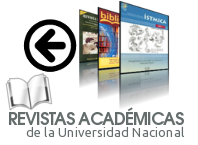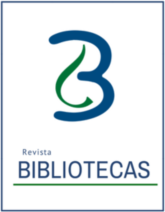College libraries in Caracas, Venezuela
DOI:
https://doi.org/10.15359/rb.35-1.3Keywords:
Colleges Libraries in Caracas, Venezuela, Librarianship and Information Science, Libraries MakersAbstract
University libraries are institutions that store, manage and disseminate useful information for the fundamental tasks of universities: teaching, research and fostering relations with the communities through outreach activities; this way, they permanently generates new knowledge, training technologically up-to-dated professional with social sensitivity, thus contributing of culture and the transmission of democratic values to the communities where they are located.
The project of constructing a building for a university library requires setting up a working team to implement the project and, especially, developing that will point the way, as well as one or more individuals who are known as makers, who commit themselves and fight to attain the objectives. In this document, we highlight the work done in two university libraries that, due to their architectural characteristics, the value of their collections and the efficiency of their services are an example of what university libraries should be in a high-tech world.
References
ALA. (1983). Glossary of library and information science. Chicago, IL: American Library Association.
Albornoz, O. (2003). Educación y Sociedad en América Latina: una década después. En Fermentum, Año 13 (37).
Brundtland, G. (1987). Nuestro futuro común. New York: Comisión Mundial del Medio Ambiente y el Desarrollo (CMMAD).
Gaceta Oficial No. 1429, Extraordinario. Ley de Universidades. 8 de septiembre de 1970. Caracas, Venezuela. Disponible en: http://www.ucv.ve/fileadmin/user_upload/documentos/ley_de_universidades.pdf
Grases, P. (1984). Ciencia y humanismo en la Metropolitana, El Nacional. 30 de marzo de 1984. Disponible en: http://fundacionpedrograses.com/pedrograsesum.html
Grases, P. (1989). Escritos selectos. Caracas: Biblioteca Ayacucho.
Larrea, M. (2006). La gestión del conocimiento y la universidad del futuro. En Revista Faces. Instituto de Investigación de la Facultad de Ciencias Económicas y Sociales, Universidad de Carabobo. Vol. 17 (1).
Seefeldt, J. y Syré, L. (Editores) (2004). Las bibliotecas en Alemania: puertas abiertas al pasado y al futuro. Por iniciativa de la Unión Federal de Asociaciones Alemanas de Bibliotecas. Zürich: Editorial Hildesheim.
Márquez, A. (2002). Una deuda impagable; la de Venezuela con Don Pedro Grases. Biblio 3W, Revista Bibliográfica de Geografía y Ciencias Sociales, Universidad de Barcelona, Vol. 7, (411).
Méndez, I. (2006). (Coord.). El legado de Grases en Venezuela. Caracas: Fundación Pedro Grases, 163 p. (Colección Estudios sobre Pedro Grases, 2).
Moleiro, R. (1997). Historia de la Universidad Metropolitana. Caracas: Editorial Arte.
Moleiro, R. (1985). Discursos e intervenciones 1978-1984. Caracas: Editorial Metropolitana.
Olivieri, G; Arráiz, R. y Mondolfi, E. (2010). Tres retratos y un destino: Eugenio Mendoza Goiticoa, Pedro Grases y Arturo Uslar Pietri. Caracas: Universidad Metropolitana, Centro de Estudios Latinoamericanos Arturo Uslar Pietri (CELAUP).
Palacios, D. (2013). La UCAB inauguró edificio para crear e investigar. El Nacional, 23 de mayo de 2013, Sociedad. Obtenido de http://www.el-nacional.com/sociedad/Biblioteca-Centro_cultural-Centro_Cultural_Padre_Carlos_Guillermo_Plaza-UCAB_0_194980701.html
UNESCO. (1973). Aprender a ser. Paris: Unesco.
UNIMET (2006). Memoria de un viaje. Caracas: Ediciones del Decanato de Estudiantes de la Universidad Metropolitana.
UNIMET (s.f.). Historia. Obtenido de http://www.unimet.edu.ve/historia/
Universidad Católica Andrés Bello (s.f.). Acerca de la Universidad. Obtenido de http://w2.ucab.edu.ve/la-ucab.1885.html
Downloads
Published
How to Cite
Issue
Section
License
Bibliotecas provide immediate open access to their content, based on the principle of facilitating research to the public free of charge and free of charge to promote the global exchange of knowledge.
The journal Bibliotecas is a publication hosted by a public higher education institution, which is supported by public resources. Since its inception, the magazine has offered all its contents free of charge without any restriction on the rights of: reading, downloading and printing in full text. Works published in libraries may be analyzed, quoted and reproduced in whole or in part, mentioning the original source.
The journal Bibliotecas is licensed under the Creative Commons Attribution - Non-Commercial - Share Equal, 4.0 International license; therefore, it is allowed to: share, copy and redistribute the material in any medium or format.

Este obra está bajo una licencia Creative Commons Atribución-NoComercial-CompartirIgual 4.0 Internacional.








